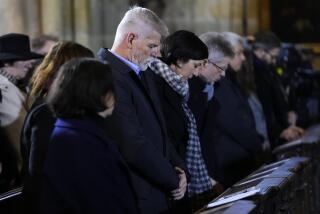TV Review : Czech ‘Spring’ 20 Years Later: People Still Wait
- Share via
It was “socialism with a human face” that Czech leader Alexander Dubcek promised his nation during “The Prague Spring”,that brief period of reform cultural flowering in 1968 that was extinguished quickly it bloomed. And it is a stream of human faces, talking about Czechoslovakia 20 years later, that distinguishes “Czechoslovakia: The Long Wait for Spring” (tonight at 10 on Channel 28).
These witnesses to a quiet contemporary tragedy speak more eloquently than the voice-over reportage (Bill Kurtis narrated; Sanford Ungar was the principal writer). Few words surpass the brutal and absurd images--culled from a variety of archival sources--of Soviet tanks rumbling through Prague streets and past imploring, bewildered citizens.
Elsewhere, this WTTW/Chicago-produced film buckles under to a cliched, monochromatic style when trying to examine Czechoslovakia today (sample: “The old still stands in splendor, but there is new reality made largely of concrete.”).
Andree Werlin’s sometimes frantic, jump-cut editing fails to add life to the report, as do the state-supplied interviewees who have no complaints. Surprisingly, the interviews with dissidents are seldom more than the familiar laments of persecuted intelligentsia.
The exceptions include filmed visits to clandestine meetings of Charter 77, the persecuted human rights watchdog group; clips from daring feature films on taboo subjects, such as drug abuse and black marketeering; a dissident reporting on beatings and kidnapings by Czech security forces, and footage of the spectacular theater group, Laterna Magika.
Czechoslovakia is peculiarly identified by its culture, and though there are visits with various artists, those best-known in the West--the Jazz Section music club, playwright Vaclav Havel and novelist Milan Kundera (“The Unbearable Lightness of Being”)--are conspicuously absent.
The often-imprisoned Havel and Jazz Section members may have declined interviews out of self-preservation. But Kundera, based in Paris, has no such fears. His always-potent commentary on his homeland’s place in the world would have invigorated a program seriously in need of a fresh point of view.
More to Read
The complete guide to home viewing
Get Screen Gab for everything about the TV shows and streaming movies everyone’s talking about.
You may occasionally receive promotional content from the Los Angeles Times.






